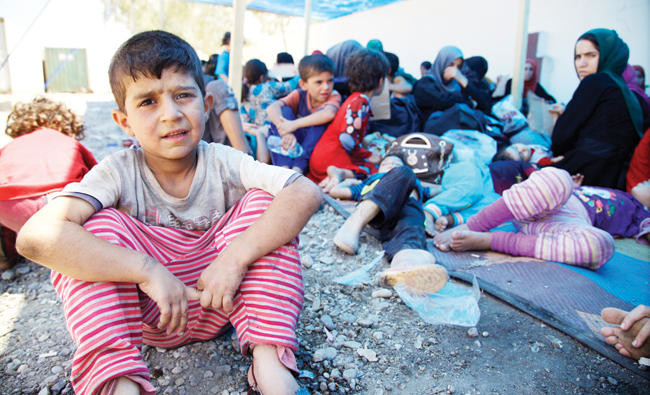NEW YORK: Iraq is asking the UN Security Council for assistance in collecting evidence to prosecute extremists from Daesh for possible crimes against humanity.
Iraqi Foreign Minister Ibrahim Al-Jaafari said in a letter to UN Secretary-General Antonio Guterres circulated on Wednesday that his government and the UK are working on a draft Security Council resolution seeking assistance.
It was sent more than five months after human rights lawyer Amal Clooney urged Iraqi Prime Minister Haider Al-Abadi to send a letter to the council so it can vote to set up an investigation into crimes by Daesh in Iraq.
Clooney represents victims of Daesh rapes and kidnappings from Iraq’s Yazidi community.
The lawyer, who is the wife of actor George Clooney, said in early March that the world’s nations must not let Daesh “get away with genocide.”
Amal Clooney on Wednesday welcomed Al-Jaafari’s letter as an important first step to bring Daesh members to justice.
But she cautioned that it will only be meaningful if the Security Council acts promptly so evidence can be collected of crimes by Daesh, which is also known as ISIS and by the Arab acronym Daesh.
“Yazidis and other ISIS (Daesh) victims want justice in a court of law, and they deserve nothing less,” Clooney said in a statement.
“I hope that the Iraqi government’s letter will mark the beginning of the end of impunity for genocide and other crimes that ISIS is committing in Iraq and around the world.”
Jonathan Allen, Britain’s deputy UN ambassador, said the UK is delighted the Iraqi government’s letter makes clear it wants accountability. He noted that Iraq, Britain and Belgium launched a campaign last September to prosecute IS crimes.
Allen said London will work to put forward a resolution to achieve accountability, “leaving no hiding place for Daesh anywhere.”
Russian Ambassador Vassily Nebenzia told reporters: “Of course we’ll support it — (but) we’ll have to see the resolution.”
Matthew Rycroft, Britain’s UN ambassador, said in March that the aim of a Security Council resolution would be to assist Iraq “with the difficult but crucial challenge of preserving the huge amount of evidence of Daesh crimes committed on Iraqi territory.”
In the letter, Al-Jaafari praised Iraq’s armed forces for recently liberating the city of Mosul from “the Daesh terrorist organization” and for “brilliant military victories with the support and cooperation of the international coalition.”
“The crimes committed by the Daesh terrorist organization against civilians and destruction of infrastructure and archaeological sites in Iraq are crimes against humanity, which makes it important to bring its perpetrators from Daesh terrorist gangs to justice, in accordance (with) the Iraqi law,” he said.
Accountability mechanism
In this light, Al-Jaafari said, “we request assistance of the international community to get benefited from international expertise to criminalize Daesh terrorist entity.”
The foreign minister underlined Iraq’s “sovereignty and jurisdiction” in both negotiating and implementing any Security Council resolution.
A council diplomat said on Wednesday that work on a resolution was just getting started.
In March, Clooney said it was initially Iraq’s idea to involve the UN and she told the Iraqi prime minister that sending a letter “would silence those who doubt your commitment to bring Daesh to justice.”
If no letter is forthcoming, she said, the Security Council could act without Iraq’s consent or it could refer the extremist group to the International Criminal Court, or the General Assembly could establish “an accountability mechanism” as it did for crimes in Syria in December. The secretary-general could also launch an investigation, she said.
Nadia Murad, a Yazidi survivor and UN goodwill ambassador, said on Wednesday she was grateful to Iraq for taking a first step toward justice.
“Victims deserve a meaningful accountability mechanism in which they trust and I hope the Security Council resolution will reflect that,” she said in a statement.


Iraq asks UN to collect evidence to prosecute Daesh
Iraq asks UN to collect evidence to prosecute Daesh

Pentagon announces $8.6 billion Boeing contract for F-15 jets for Israel

WASHINGTON: Boeing was given an $8.6 billion contract for the F-15 Israel Program, the Pentagon said on Monday, after US President Donald Trump met Israeli Prime Minister Benjamin Netanyahu in Florida.
“This contract provides for the design, integration, instrumentation, test, production, and delivery of 25 new F-15IA aircraft for the Israeli Air Force with an option for an additional 25 F-15IA aircraft,” the Pentagon said.
© 2025 SAUDI RESEARCH & PUBLISHING COMPANY, All Rights Reserved And subject to Terms of Use Agreement.












